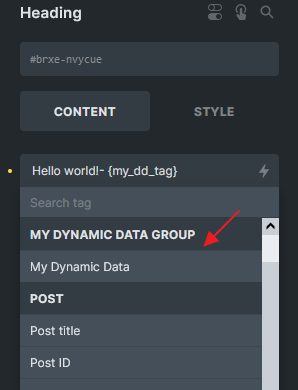This article is intended for developers who wish to create a custom dynamic data tag within the builder.
The desired outcome should resemble the following example:

Step 1: Register a tag through filter: bricks/dynamic_tags_list
Use the bricks/dynamic_tags_list filter to render your custom dynamic data tag in the builder.
add_filter( 'bricks/dynamic_tags_list', 'add_my_tag_to_builder' );
function add_my_tag_to_builder( $tags ) {
// Ensure your tag is unique (best to prefix it)
$tags[] = [
'name' => '{my_dd_tag}',
'label' => 'My Dynamic Data',
'group' => 'My Dynamic Data Group',
];
return $tags;
}Step 2: Hook on several filters
1) bricks/dynamic_data/render_tag
This will be used when \Bricks\Integrations\Dynamic_Data\Providers::render_tag() is called to parse a specific tag.
add_filter( 'bricks/dynamic_data/render_tag', 'get_my_tag_value', 10, 3 );
function get_my_tag_value( $tag, $post, $context = 'text' ) {
// $tag is the tag name without the curly braces
// Only look for dynamic tag my_dd_tag
if ( $tag !== 'my_dd_tag' ) {
return $tag;
}
// Do your custom logic here, you should define run_my_dd_tag_logic() function
$value = run_my_dd_tag_logic();
return $value;
}
function run_my_dd_tag_logic() {
// Do your custom logic here
$my_value = 'My dynamic data value:';
return $my_value;
}If you intend to accept an argument such as “my_dd_tag:arg1“, you may need to adjust the logic accordingly. Here is a basic example using PHP logic. For more complex scenarios, you can adapt the logic as needed:
add_filter( 'bricks/dynamic_data/render_tag', 'get_my_tag_value', 10, 3 );
function get_my_tag_value( $tag, $post, $context = 'text' ) {
// $tag is the tag name without the curly braces
// Only look for dynamic tag starts with my_dd_tag:
if ( strpos( $tag, 'my_dd_tag:' ) === false ) {
return $tag;
}
// Get argument
$argument = str_replace( 'my_dd_tag:', '', $tag );
// Do your custom logic here, you should define run_my_dd_tag_logic() function
$value = run_my_dd_tag_logic( $argument );
return $value;
}
function run_my_dd_tag_logic($argument) {
// Do your custom logic here
$my_value = 'My dynamic data value: ' . $argument ;
return $my_value;
}2) bricks/dynamic_data/render_content and bricks/frontend/render_data
These will be used when \Bricks\Integrations\Dynamic_Data\Providers::render_content() is invoked to parse strings that may contain various dynamic tags within the content. One of the functions that perform this action is bricks_render_dynamic_data().
It is crucial to exercise extra caution while working on this aspect, as any mishandling may disrupt the dynamic tag functionality across the entire website.
add_filter( 'bricks/dynamic_data/render_content', 'render_my_tag', 10, 3 );
add_filter( 'bricks/frontend/render_data', 'render_my_tag', 10, 2 );
function render_my_tag( $content, $post, $context = 'text' ) {
// $content might consists of HTML and other dynamic tags
// Only look for dynamic tag {my_dd_tag}
if ( strpos( $content, '{my_dd_tag}' ) === false ) {
return $content;
}
// Do your custom logic here, you should define run_my_dd_tag_logic() function
$my_value = run_my_dd_tag_logic();
// Replace the tag with the value you want to display
$content = str_replace( '{my_dd_tag}', $my_value, $content );
return $content;
}
If your dynamic tag accepts an argument, consider the following example:
add_filter( 'bricks/dynamic_data/render_content', 'render_my_tag', 10, 3 );
add_filter( 'bricks/frontend/render_data', 'render_my_tag', 10, 2 );
function render_my_tag( $content, $post, $context = 'text' ) {
// $content is the content of the element, including other dynamic tags, HTML, etc.
// Only look for content starts with {my_dd_tag:
if ( strpos( $content, '{my_dd_tag:' ) === false ) {
return $content;
}
// Regex to match my_dd_tag: tag
preg_match_all( '/{(my_dd_tag:[^}]+)}/', $content, $matches );
// Nothing grouped in the regex, return the original content
if ( empty( $matches[0] ) ) {
return $content;
}
foreach ( $matches[1] as $key => $match ) {
$tag = $matches[0][ $key ];
// Get the dynamic data value, $match is the tag name without the curly brackets
// Can reuse the get_my_tag_value function created earlier
$value = get_my_tag_value( $match, $post, $context );
// Replace the tag with the transformed value
$content = str_replace( $tag, $value, $content );
}
return $content;
}